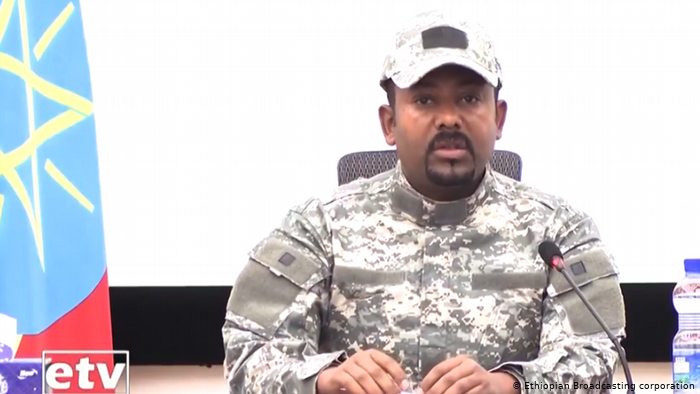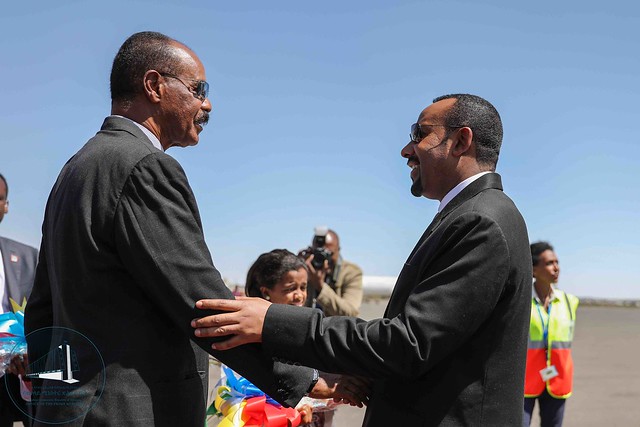By Amb. Mohammed Ahmed Awil
The Ethiopian Prime Minister, Abiy Ahmed Ali, stands out as one of the youngest leaders in East Africa and the entire African continent. He rose to power at the age of 42 in February 2018, following the resignation of his predecessor Prime Minister Hailemarian Desalegn, he quickly exemplified himself as a peacemaker and a collaborative international leader. He ended Ethiopia’s long-running border disputes with Eritrea, a former part of the larger Ethiopia that seceded in 1991 when the Derg Regime ended.

Against significant challenges, Abiy Ahmed Ali demonstrated his commitment to peace by embracing the 2000 Peace Agreement that ended Ethiopia’s border dispute with Eritrea that started in 1998 by accepting and implementing the 2002 border demarcation between the two states that was previous rejected by Ethiopia, on June 5, 2018. He followed this gesture of good neighborliness with a visit to Eritrea in July 2018 for an official state visit and held discussions with the Eritrean President, Isaias Afwerki and they agreed to re-establish trade, transportation, diplomacy and communication ties as well as re-opening theirs borders.
On 9th July 2018, the two leaders issued a joint statement in Eritrea, declaring an end to the 20-year prevailing war between the two states. Prime Minister Abiy also initiated reforms to strengthen the democratic process, improve the economy and even released thousands of political prisoners and delisted opposition groups termed as terrorists by previous regimes and above all signed a peace agreement with one group to end the a 30 year conflict in Ogaden region in his first year as the prime Minister. He also formed a small cabinet that reflected gender balance to the accolade of the international community and further engaged in solving regional conflicts such as the Eritrea-Djibouti, Sudan’s Civil and the Kenya-Somalia conflicts. These efforts signified a peacemaker in the person of Prime Minister Abiy resulting into his recognition as a peacemaker and awarded a Nobel Peace Prize in 2019 by the Norwegian Nobel Committee.
Currently, media reports show that Prime Minister Abiy Ahmed Ali is a changed man. He has completely forgotten about the Ethiopian civil war that resulted in the deaths of hundreds of people and the country’s economy slumbering from one of the best performing to the verge of default. As quoted by Antony Sguazzin on October 20, 2023, in Welcome to Next Africa Newsletter, the Premier in a public lecture insinuated that Ethiopia risks conflict if his landlocked country does not secure direct access to the Red Sea. He believes lack of access to a seaport denies Ethiopia its rightful position and it must just be attained either through fairness and justice or by force. From its location, Ethiopia can only access the Red Sea through Djibouti, Eritrea and Somalia. According to media reports, Somalia is steady fast on the sacrosanct of its territorial integrity; Eritrea terms his pronouncements as excessive while Djibouti who provides the current access simply said its territory is unquestionable whether now or in future.
These pronouncements remain reckless as per the UN Charter’s states sovereignty. The biggest question is which of the three countries is PM Abiy targeting? None of the three states will engage Ethiopia in the proposed fairness and justice acquisition of their ports; hence the only way is through a war. Africa has many landlocked countries that access seaports through peaceful international agreements and Ethiopia is not an exception.
The Premier’s comments are unfortunate and they bring his true-self out. His biography reveals aggressive young who joined rebels in 1990 at a tender age of 16 years. This signified something in the Premier’s character that was overlooked even by the Norwegian Nobel Committee on the Nobel Peace Prize Award. He grew up as a fighter who believes that justice can only be acquired through war and hence, only camouflaged upon acquiring Education to portray his peacemaking initiatives. Most recently, he was engaged with Tigray, rebels from the neighboring Amhara region and even a near fight with Sudan and Egypt in his quest to build a giant dam on the Blue Nile River. But taking Ethiopia to war to access a seaport will be disastrous, especially at this time when the country has enough challenges to deal with and more so against his Peace Award.

More so, upon assumption of office as the premier, he pushed for the dissolution of the four parties that constituted the Ethiopian People’s Revolutionary Democratic Front to form a single party that was to include other smaller parties in late 2019. Though, this was a good gesture for the premier to strengthen the local democratic process, it would have also been intended that the premier was asserting himself so as to execute his long-term wishes at will. The later point of reason might have caused the Tigray People’s Liberation Front, the dominant coalition member, to oppose this move since they were on going to losing their powers. All this was happening at the backdrop of the 2020 elections, which were however postponed due to COVID-19 pandemic but opposed by the Ethiopian People’s Revolutionary Democratic Front and other opposition leaders on claims of the Premier trying to cling on power beyond his mandate.
In conclusion, the portrayal of Prime Minister Abiy Ahmed as a genuine peacemaker, as reflected in his Nobel Peace Prize, comes into question. His involvement in military operations in the Tigray region, particularly the war to capture Mekelle, the region’s capital, and the subsequent declaration of victory, reveals a more assertive and militaristic side. This approach seems to contradict the principles of peaceful conflict resolution outlined in the UN Charter, which emphasizes negotiation processes over resorting to war as a means of problem-solving.
Furthermore, he blamed Eritrea of participating in the Tigray on slaughter, suggesting that his war with Eritrea is not yet over and could be targeting Eritrea to execute its right to access the Red Sea by force; hence its blame was aimed at getting an excuse to execute its plans. According to a facebook tweet by Yonas Biru, PM Abiy intends to acquire its own sea outlet, thus apart from the seaport; it will also acquire land from the targeted country. Such a move could be a toll order given the current position by Ethiopia’s neighbors.
Amb. Mohammed Ahmed Awil,
Former Federal Republic of Somalia Ambassador Extraordinary and Plenipotentiary
The People’s Republic of China
We welcome the submission of all articles for possible publication on WardheerNews.com. WardheerNews will only consider articles sent exclusively. Please email your article today . Opinions expressed in this article are those of the author and do not necessarily reflect the views of WardheerNews.
WardheerNew’s tolerance platform is engaging with diversity of opinion, political ideology and self-expression. Tolerance is a necessary ingredient for creativity and civility.Tolerance fuels tenacity and audacity.
WardheerNews waxay tixgelin gaara siinaysaa maqaaladaha sida gaarka ah loogu soo diro ee aan lagu daabicin goobo kale. Maqaalkani wuxuu ka turjumayaa aragtida Qoraaga loomana fasiran karo tan WardheerNews.
Copyright © 2024 WardheerNews, All rights reserved


